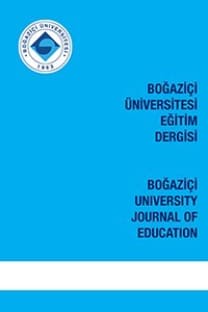Fostering Mathematical Communication in Primary Mathematics Classroom: A Study on Classroom Teachers
Öz
Higher order thinking skills are of preliminary importance for today’ societies. Students need to engage in meaningful learning activities to develop these skills. Creating a fruitful mathematical communication environment, where students express their ideas about their mathematical understanding, is also essential for keeping cognitive demands of mathematical tasks high. The study aims to enhance teachers’ skills to foster mathematical communication in their classrooms to maintain the cognitive demand of the tasks high. Within this case study data was analyzed using content analysis. Results of the study show that enhancing mathematical communication in classroom is essential for monitoring students’ understanding, and using strategies and talk moves to enhance mathematical communication has a role by maintaining the level of the cognitive demand.
Anahtar Kelimeler:
Mathematical communication, cognitive demand, mathematics instruction
___
- Brendefur, J., & Frykholm, J. (2000). Promoting mathematical communication in the classroom: Two pre-service teachers' conceptions and practices. Journal of Mathematics Teacher Education, 3(2), 125-153.
- Chapin, S. H., O’Connor, C., & Anderson, N. C. (2003). Classroom discussions: Using math talk to help students learn. Sausalito, CA: Math Solutions.
- Cooke, B. D., & Buchholz, D. (2005). Mathematical communication in the classroom: A teacher makes a difference. Early Childhood Education Journal, 32(6), 365- 369.
- Creswell, J.W. (2012). Educational research: Planning, conducting, and evaluating quantitative and qualitative research (4th ed.). Boston: Pearson.
- Doyle, W. (1983). Academic work. Review of educational research, 53(2), 159-199.
- Doyle, W. (1988). Work in mathematics classes: The context of students’ thinking during instruction. Educational Psychologist, 23(2), 167-180.
- Franke, M.L., Webb,N.W, Chan, A.G., Ing, M., Freund, D. & Battey, D. (2009). Teacher questioning to elicit students' mathematical thinking in elementary school classrooms. Journal of Teacher Education, (60) 4, 380-392
- Georgius, K. (2013). Planning and enacting mathematical tasks of high cognitive demand in the primary classroom. Unpublished Doctoral Dissertation, Educational Studies, University of Nebraska, USA.
- Grant, T. J., Kline, K., Crumbaugh, C., Kim, O., & Cengiz, N. (2009). How can curriculum materials support teachers in pursuing student thinking during wholegroup discussions? In J. T. Remillard, B. A. Herbel Eisenmann, & G. M. Lloyd (Eds.), Mathematics teachers at work: Connecting curriculum materials and classroom instruction (pp. 103-117). New York: Routledge
- Henningsen, M., & Stein, M. K. (1997). Mathematical tasks and student cognition: Classroom-based factors that support and inhibit high-level mathematical thinking and reasoning. Journal for Research in Mathematics Education, 524-549.
- Jung, H. Y., & Reifel, S. (2011). Promoting children's communication: A kindergarten teacher's conception and practice of effective mathematics instruction. Journal of Research in Childhood Education, 25(2), 194-210.
- Kaya, D., & Aydin, H. (2014). Elementary Mathematics Teachers' Perceptions and Lived Experiences on Mathematical Communication. Eurasia Journal of Mathematics, Science & Technology Education, 10(6), 619-629.
- Kysh, J., Thompson, A., & Vicinus, P. (2007). Mathematical discourse. Mathematics Teacher, 101(4), 245.
- Mooney, C., Briggs, M., Gomm, R., Hansen, A., & McCullouch, J. (2009). Primary mathematics: teaching theory and practice. Exeter:Learning Matters.
- Pape, S. J., Bell, C. V., & Yetkin, İ. E. (2003). Developing mathematical thinking and self-regulated learning: A teaching experiment in a seventh-grade mathematics classroom. Educational Studies in Mathematics, 53(3), 179-202.
- Piccolo, D. L., Harbaugh, A. P., Carter, T. A., Capraro, M. M., & Capraro, R. M. (2008). Examining discourse in middle school: Mathematics instruction. Journal of Advanced Academics, 19(3), 376-410.
- Rasmussen, C., Apkarian N., Dreyfus, T., Voigt, M. (2016). Ways in which engaging in someone else’s reasoning is productive. First conference of International Network for Didactic Research in University Mathematics, March 2016, Montpellier, France.
- Smith, M. S. & Stein, M. K. (2011). 5 practices for orchestrating productive mathematical discussions. Reston, VA: National Council of Teachers of Mathematics.
- Stein, M. K., & Smith, M. S. (1998). Mathematical tasks as a framework for reflection: From research to practice. Mathematics Teaching in the Middle School, 3(4), 268- 275.
- Stein, M. K., Grover, B. W., & Henningsen, M. (1996). Building student capacity for mathematical thinking and reasoning: An analysis of mathematical tasks used in reform classrooms. Educational Research Journal, 33(2), 455-488.
- Stein, M. K., Smith, M. S., Henningsen, M. A., & Silver, E. A. (2000). Implementing standards-based mathematics instruction: A casebook for professional development. New York: Teachers College Press.
- Varol, F., & Farran, D. C. (2006). Early mathematical growth: How to support young children’s mathematical development. Early Childhood Education Journal, 33(6), 381-387.
- Yin, R. K. (1984). Case study research: Design and methods. Newbury Park, CA: Sage.
- ISSN: 1300-9567
- Yayın Aralığı: 3
- Başlangıç: 1976
- Yayıncı: Boğaziçi Üniversitesi
